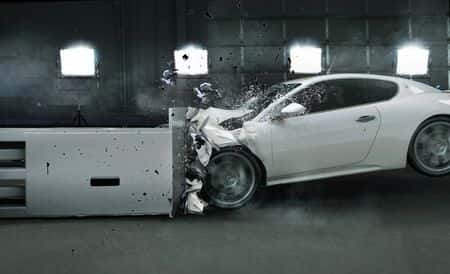Biomechanics Expert Witness Opines on Truck Accident
Updated on
Case: Burke v. TranSam Trucking, Inc., 617 F. Supp. 2d 327 (M.D. Pa. 2009)
Background: This case arises from a vehicle accident involving the commercial tractor trailer driven by Gregory Wirfel (“Defendant Wirfel”) and the 2000 Ford Ranger pickup truck driven by James Burke (“Plaintiffs”). At all times relative to this accident, Defendant Wirfel was employed by TransAm Trucking, Inc. (“Defendant “TransAm”). Plaintiffs alleged Defendant Wirfel and Defendant TransAm (collectively referred to as “Defendants”) were liable to them for damages resulting from the accident.
Expert Witness: Plaintiffs obtained the services of Dr. Ziejewski, a biomechanic and kinesiology expert witness, in order to determine if the forces exerted on Plaintiff in this accident were sufficient to cause injuries. Dr. Ziejewski based his medical opinions on the police report, complaint, witness statements, medical records, and photographs.
Dr. Ziejewski also obtained the vehicle parameters for a 2000 Ford Ranger (Plaintiff’s vehicle) and a 2005 Freightliner (Defendants’ Tractor Trailer); obtained and measured an exemplar 2000 Ford Ranger; performed laboratory compression testing; performed vehicle dynamics analysis; utilized Armstrong Laboratory/Wright-Patterson Air Force Base (AL/WPAFB) computer program to analyze this data; determined the geometric and mass properties of Plaintiff’s body segments and joint locations and range of motion characteristics using the Generator of Body Data (GEBOD) AL/WPAFB computer program and performed dynamic analysis for the collision using this program.
After conducting his analysis and testing, and reviewing numerous articles and studies, Dr. Ziejewski came to the following conclusions “within a reasonable degree of biomechanical engineering certainty”:
(1) the forces on James Burke’s head resulting from the collision on April 10, 2006 were sufficient to cause a brain injury;
(2) the forces on James Burke’s cervical region resulting from the collision on April 10, 2006 were sufficient to cause a cervical region injury;
(3) the results from the biomechanical analysis of the collision on April 10, 2006 involving James Burke are consistent with the medical opinions and findings indicating a brain injury; and
(4) the results from the biomechanical analysis of the collision on April 10, 2006 involving James Burke are consistent with the medical opinions and findings indicating a cervical region injury.
Daubert Challenge: Defendants moved to preclude Dr. Ziejewski from offering into evidence any testimony, reports or opinions at trial because his opinions exceeded the scope of his expertise, lacked a reliable factual foundation, and lacked scientific reliability.
Conclusion:
First, the Court found that Dr. Ziejewski was well qualified as a biomechanical expert. Dr. Ziejewski was a professor of mechanical engineering at North Dakota State University, an adjunct professor of neuroscience at the University of North Dakota School of Medicine, and director of the Impact Biomechanical Laboratory and the Automotive Systems Laboratory at North Dakota State University’s College of Engineering. He had specialized knowledge, skill and training in the field of biomechanics and had continually been recognized as a biomechanic expert in many courts throughout the country for twenty-five years.
Defendants also argued that Dr. Ziejewski’s opinion that the forces Plaintiff sustained in the subject collision were sufficient to cause a brain injury and a cervical region injury were actually a medical opinon, and should therefore be precluded because this goes beyond his expertise as a biomechanic. The Plaintiffs disagreed and asserted that Dr. Ziejewski’s opinion as to the potential injuries that could be sustained in the subject accident is a biomechanical determination based on established biomechanical parameters, not a medical opinion. The Court found that Dr. Ziejewski’s testimony fell within his expertise and therefore that he was qualified to testify on it. In conducting his analysis, Dr. Ziejewski stayed within this area of expertise and relied on biomechanical parameters in forming his opinions. As a biomechanical engineer, Dr. Ziejewski was qualified to opine on general causation, but not specific causation.This meant that Dr. Ziejewski could not testify as to the extent of injuries suffered by Plaintiff, which would require the identification and diagnosis of a medical condition, but could testify that the force sustained by Plaintiff in the subject accident could potentially cause certain injuries as this amounts to a biomechanical determination.
The Court also found that Dr. Ziejewski met the reliability requirement of the Daubert analysis. The Court found that Dr. Ziejewski’s opinions were based on “methods and procedures” rather than subjective belief or unsupported speculation and that he had “good grounds” for his beliefs. Based on Dr. Ziejewski’s testimony at the hearing, the Court found that Dr. Ziejewski’s methodology fell in line with the facts that a district court should take into account in evaluating whether a particular scientific methodology is reliable under Daubert. Specifically, the Court found Dr. Ziejewski’s methodology consisted of testable hypothesis, was subjected to peer review, had a known or potential rate of error, was generally accepted, and the techniques were sufficiently established to be reliable.
As the Court noted during the hearing, many of Defendants’ arguments and criticisms of Dr. Ziejewski’s methodology and inputs used went more to the weight of the evidence, rather than to his ability to testify as an expert in this case. Mere weakness in the factual basis of an opinion bears on the weight of the evidence, not its admissibility. At trial, Defendants wouldl have the opportunity to demonstrate why Dr. Ziejewski’s conclusions should not be credited or given substantial weight. However, at this stage the Court was satisfied that Plaintiffs had sufficiently met their burden in establishing the reliability of this testimony.
Subscribe to our newsletter
Join our newsletter to stay up to date on legal news, insights and product updates from Expert Institute.
Sign up nowFind an expert witness near you
What State is your case in?
Subscribe to our newsletter
Join our newsletter to stay up to date on legal news, insights and product updates from Expert Institute.


